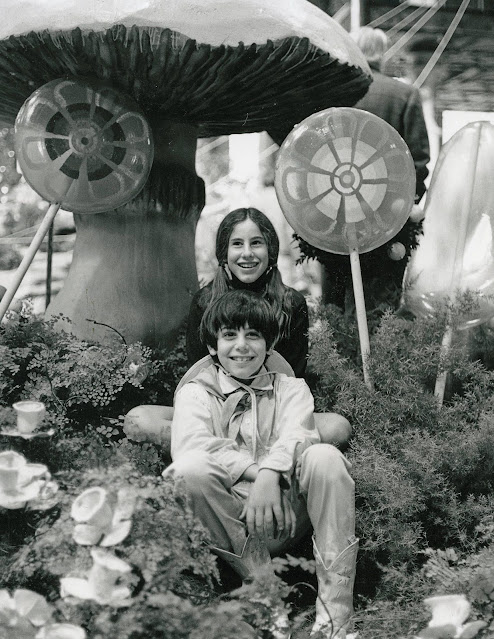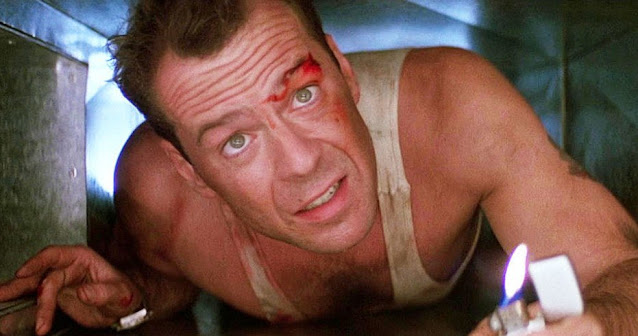A Director’s Daughter Pitched "Willy Wonka & the Chocolate Factory"
Fittingly, one of the most beloved children’s movies was made because one little girl loved Roald Dahl’s book. Director Mel Stuart admitted, "If you want to credit anyone for the creation of Willy Wonka and the Chocolate Factory, credit my daughter, Madeline. It was sometime in the fall of 1969 when my precocious 12-year-old daughter came up to me, clutching a copy of Roald Dahl's book Charlie and the Chocolate Factory. 'Daddy,' she said, 'I want you to make this into a movie and have Uncle Dave sell it.'" Despite her youth, Madeline Stuart didn’t make the suggestion lightly. "I read the book five times before pitching my dad,” she said. “Later they paid me $50—and I didn't even need a lawyer."
 |
| Madeline Stuart and her brother Peter on the set of Willy Wonka & the Chocolate Factory |
At first, Mel Stuart wasn’t entirely convinced. "You see, as a kid, she didn't realize that it wasn't that easy to make a book into a movie. I was working with a man named David Wolper and he was great at getting projects going… 'Uncle Dave’ was a very close friend, and the chief executive of the Wolper Organization, a major force in television and motion picture production. Over the years, I directed many documentary films made by Wolper. Now, in 1970, I was looking for a new feature to direct and, by chance, my daughter had provided the opportunity… I read the book and I thought it was kind of interesting – it might make a good movie – so I gave it to him. He never read the book, I just told him the story."
Stuart relished the idea of doing something a little different. "I thought that it would be rather challenging for me, because I was brought up in my whole soul a non-fiction realist, and I'd done so many documentaries. This was a fantasy. The whole thing about it, if you watch it carefully, the reason why I still think it works the way it does is that it's as realistic as it could be within the genre of fantasy."
 |
| Director Mel Stuart on the set of Willy Wonka & the Chocolate Factory |
Full credit is due to producer David Wolper, however, for brokering the unique financing deal that got the movie made. "If there ever was a dream merchant, it was David L. Wolper,” Stuart said. “Whenever I would come up with a good idea for a film, Dave somehow found a way to get it made. Once, for example, we made up a list of 30 subjects we wanted to make into documentaries. He eventually obtained backing for 29 of them."
David Wolper believes that "a producer is a person who dreams – and good producers make dreams come true." So he kept Stuart's idea in mind, and a few months later, he happened to be meeting with Ken Mason of Quaker Oats, which had sponsored some of Wolper's television projects. While Wolper was pitching to him, Mason mentioned that Quaker Oats was introducing a new candy bar, and Wolper immediately thought of Charlie and the Chocolate Factory.
It was 1970, and most of Hollywood's major studios had run out of money. MGM and Fox were selling off huge blocks of their famous backlots to real estate developers, as well as auctioning off their movie memorabilia. In this dry economic climate, feature films were being financed by companies like Mattel Toys and General Electric instead of the mammoth studios of days gone by. It was highly unusual for a cereal company to finance a feature film, but Quaker Oats decided to name their candy the “Wonka Bar,” buying the rights to the name from Dahl and putting up the movie’s frugal $3 million budget.
Mel Stuart recalled, "This was perhaps the first time and maybe the most revolutionary of the product tie-ins that would become standard with studio movies. Typically, the studio allows a corporation a product placement in the film in exchange for the creation of a huge advertising campaign for the film when it is released, as in the case of Reese's Pieces with E.T.: The Extraterrestrial, and McDonald's with the Toy Story movies. In a more inventive example, AOL made a deal for its catchphrase 'You've got mail' to be the title of a film. In this case, Quaker Oats was using the entire movie as an ad campaign for a new candy bar."
Yet at the time, producer David Wolper described his motives for making the movie differently. "I’ve always believed that the movie theatre is and should be a very special palace of dreams for young people, so I decided that the time was propitious to make a film especially aimed at them,” he said.
Arthur Knight, “Can Creativity and Commercial Tie-Up Coexist?,” Saturday Review, 1971
Willy Wonka & the Chocolate Factory, Production Notes, Wolper Pictures, 1971
Michael P. Lucas, "Sweet Legacy for a Dark Film, Los Angeles Times, 6/29/01
Daniel Robert Epstein, "Interview with Mel Stuart," ugo.com, 2002
Mel Stuart, Pure Imagination, Macmillan, 2002
David Wolper, Producer: A Memoir, Scribner, 2003


Comments